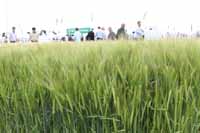Cereals crop plots to showcase latest research

Innovative science is at the heart of this year’s Cereals event, with blackgrass control, SDHI fungicide performance and tackling drought tolerance being three of many issues being demonstrated in crop plots.
No other venue combines such a rich mix of information from researchers, technicians and agronomists with such a practical resource, says event director Jon Day.
“The crop plots bring important and often complex messages to life, showing not only what is being done behind the scenes to advance the UK arable sector, but also how best to put those findings into practice on the farm.
Weed control gets a topical airing on the AICC plots with a look at the effectiveness of a range of pre- and early post-emergence chemistry against three important grassweeds – blackgrass, sterile brome and ryegrass – and a strip of mixed broad-leaved weeds is being assessed. In addition, half the area has also received a follow-up spray of Atlantis.
“We hope visitors will come along and discuss the findings and see how results compare with their own farm practice,” says the AICC’s Peter Taylor.
The performance of a new SDHI fungicide will also be compared to a standard triazole treatment to reveal any benefits from the new chemistry.
Fungicide inputs will come under the spotlight on the Rothamsted Research plots. Bill Clark, director of Broom’s Barn, part of Rothamsted, reckons the average wheat grower stands to lose £120/ha due to sub-optimal fungicide use with wheat prices at £180/t.
Potential ways to tackle drought resistance in wheats will also be on show – 30% of the UK wheat area is grown on drought-prone land, notably the eastern counties, which suffer in most summers.
Other Rothamsted plots will demonstrate the symptoms and effects of viruses on a range of different crops, namely barley, oilseed rape, potatoes and sugar beet, and highlight their effect as yield reducer and the importance of timely control.
HGCA is examining fungicide performance across three crops, applying a range of materials, including the new SDHIs, to wheat, barley and oilseed rape. “We expect a lot of interest this year following the introduction of this new fungicide group to one of our ongoing flagship funded programmes,” says HGCA’s Susannah Bolton.
The effectiveness of using higher wheat plant populations to out-compete blackgrass to help take the pressure off chemical control is also being assessed.
NIAB TAG is focusing on its core crop variety and agronomy business, where visitors can view cereal plots from the Smart Carbs project, which is developing varieties with different starch properties to improve nutritional content or provide new end-market opportunities. And beans developed for different uses and growing conditions as part of the DEFRA-funded Pulse Crop Genetic Improvement Network (PCGIN) will be displayed.
Tickets for Cereals 2011, which takes place on Wednesday 15 and Thursday 16 June at Boothby Graffoe, Lincolnshire, are now available online. It costs £20 for a standard adult ticket, while students pay just £17.

